30 Professional Nurse Cover Letter Examples for 2025
Your nurse cover letter must immediately highlight your dedication to patient care. Showcase your commitment through a personal anecdote or a professional accomplishment. Illustrate your ability to work in high-pressure environments with ease. Demonstrate your expertise with specifics about your clinical skills or special certifications.

All cover letter examples in this guide
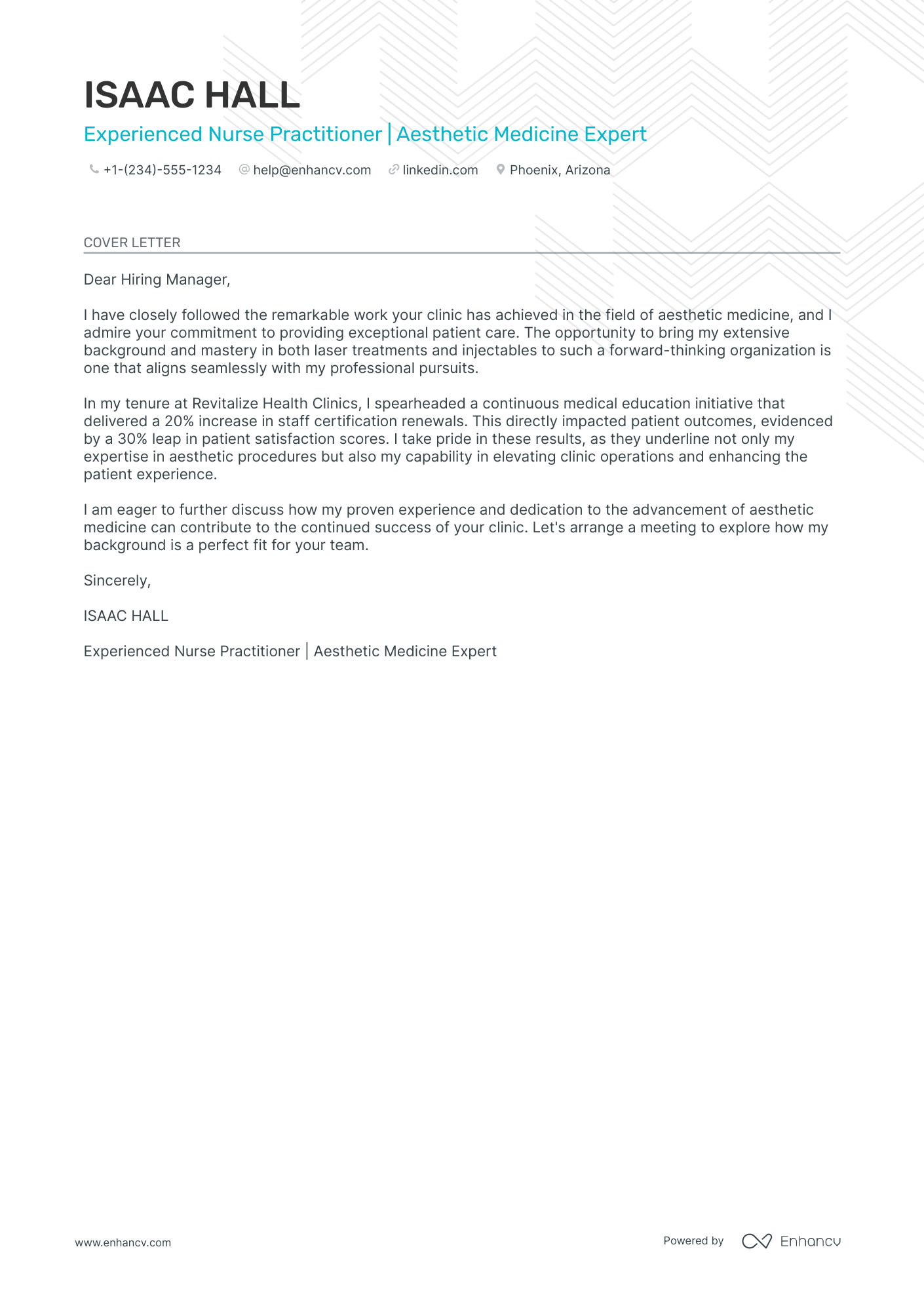
Aesthetic Nurse
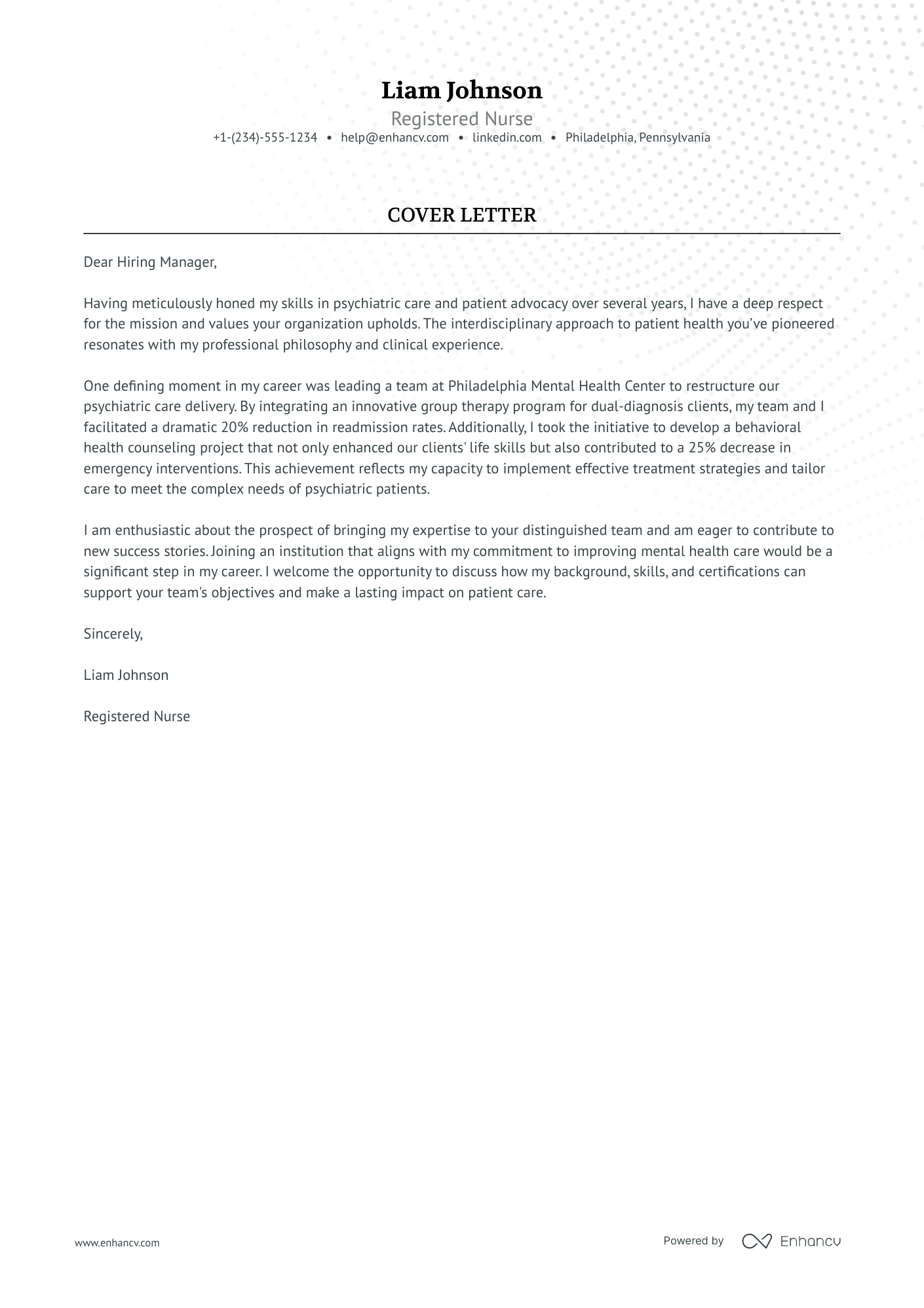
Agency Nurse
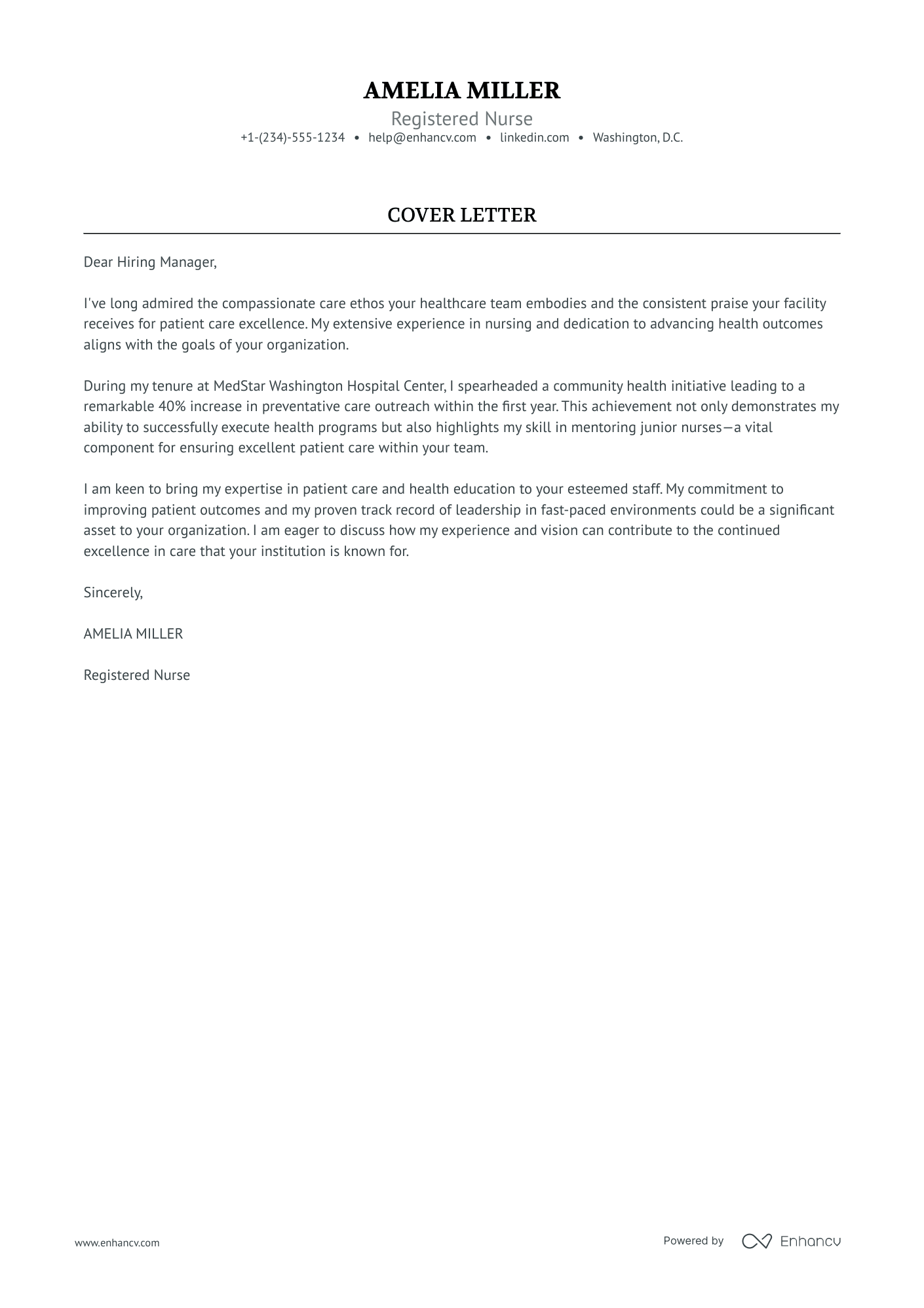
Clinical Nurse
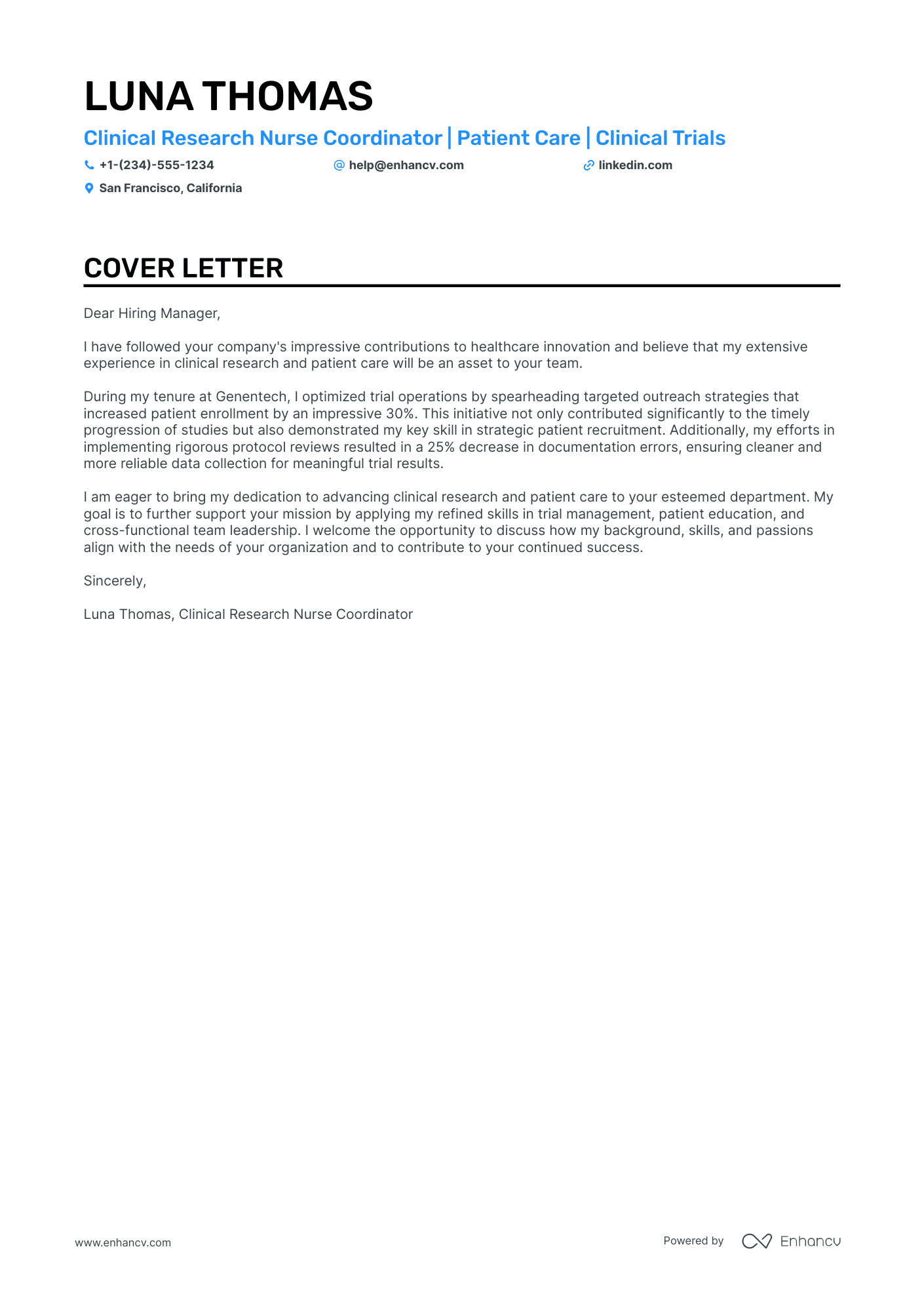
Clinical Research Nurse
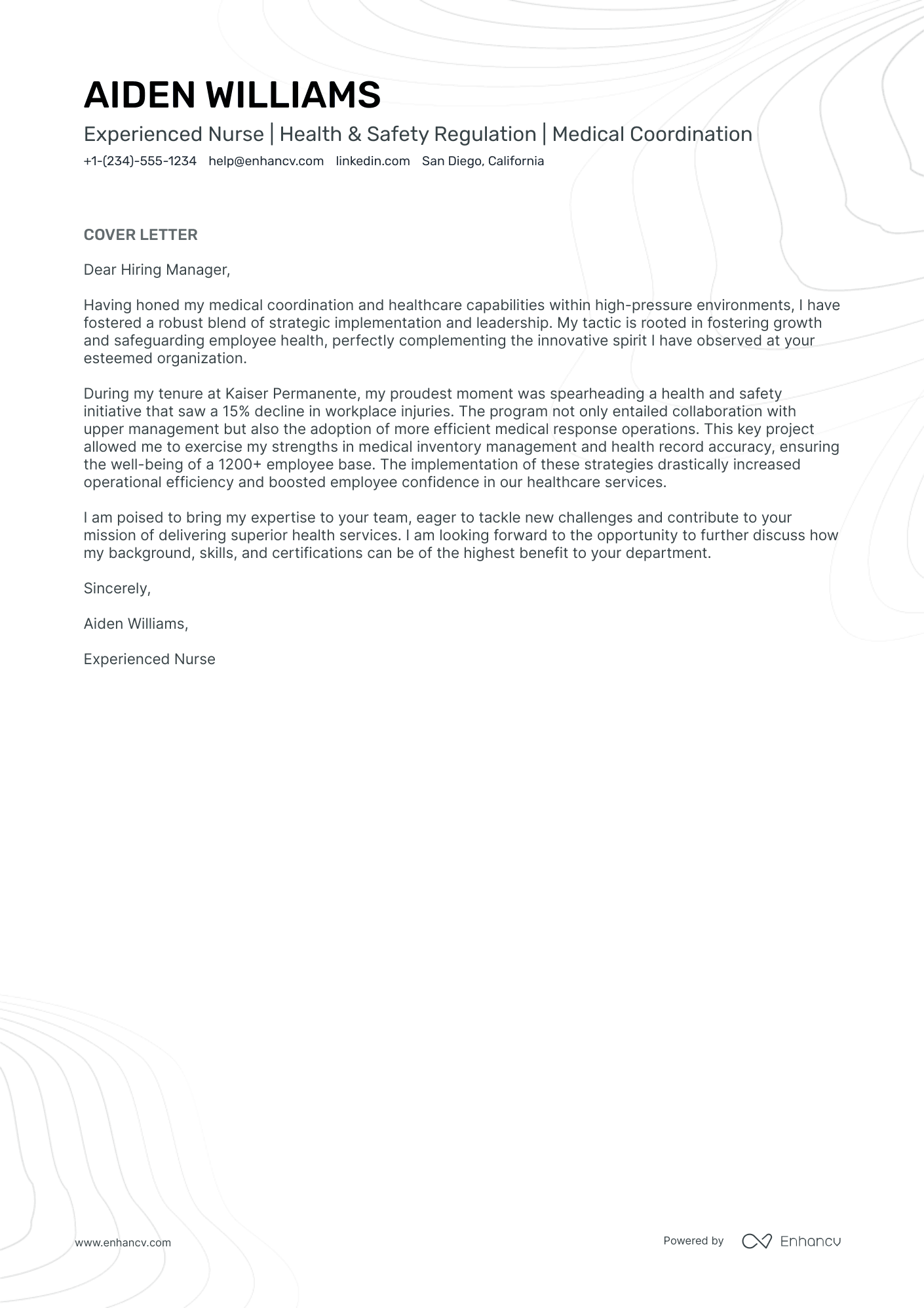
Company Nurse
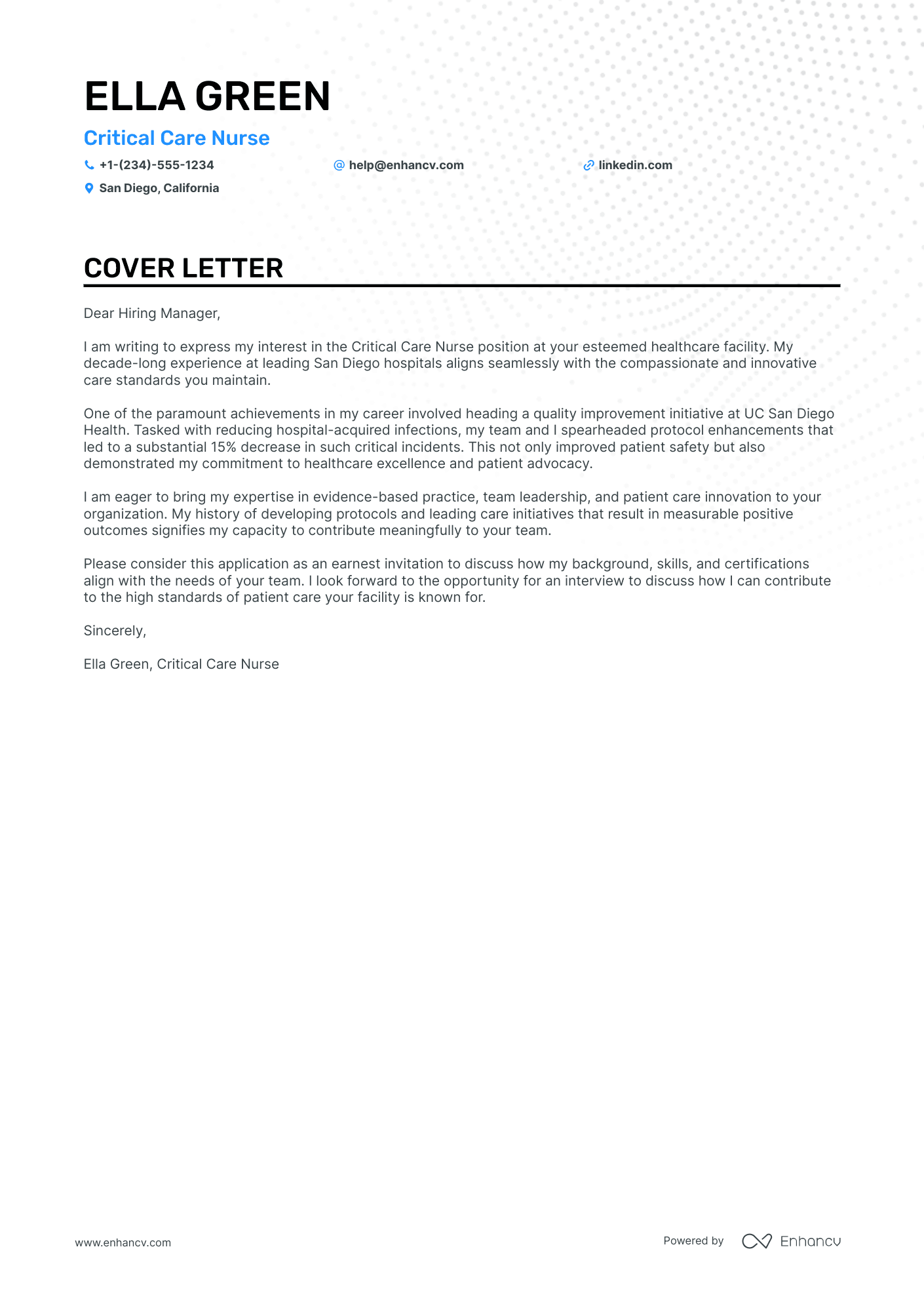
Critical Care Nurse
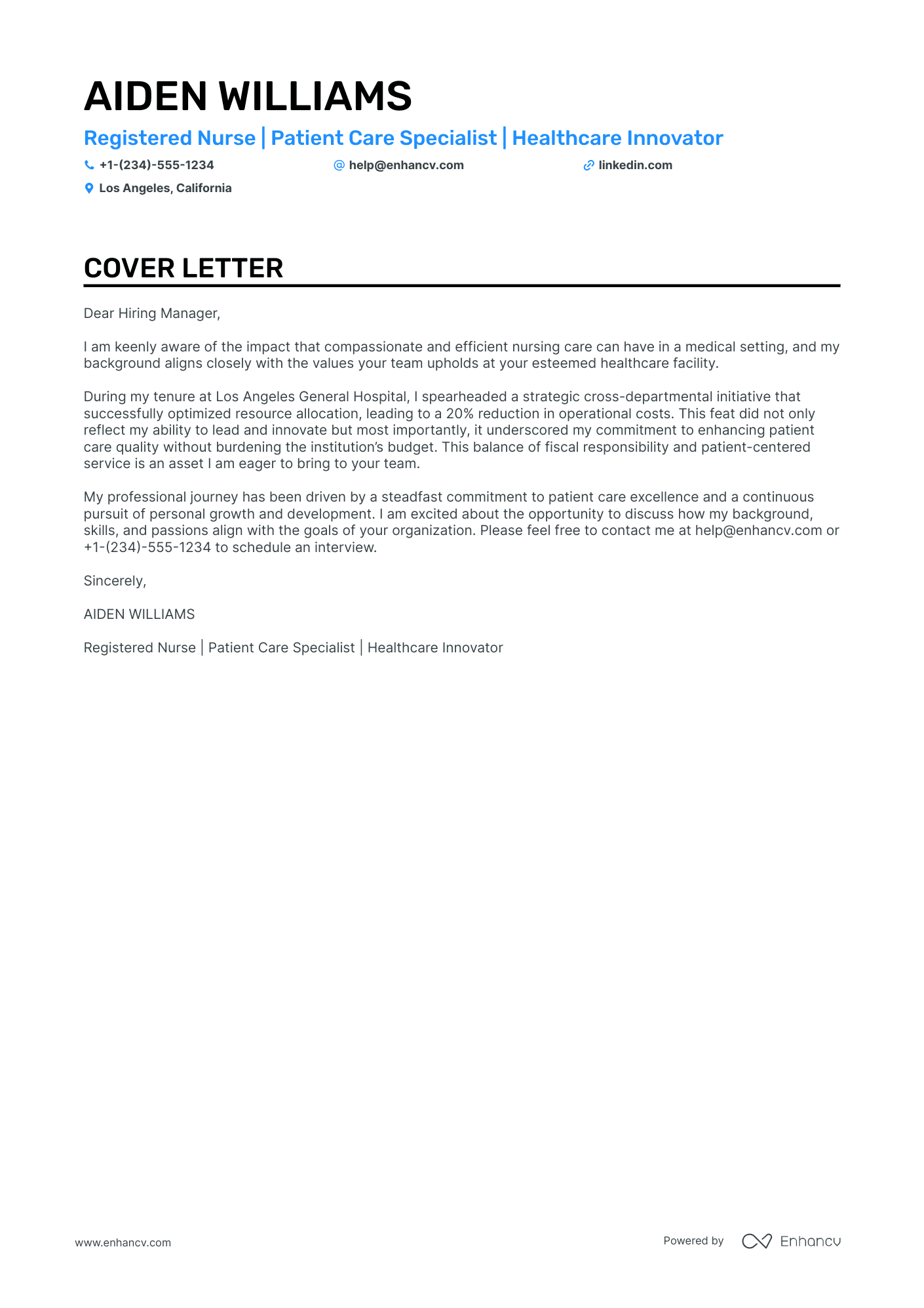
Dental Nurse
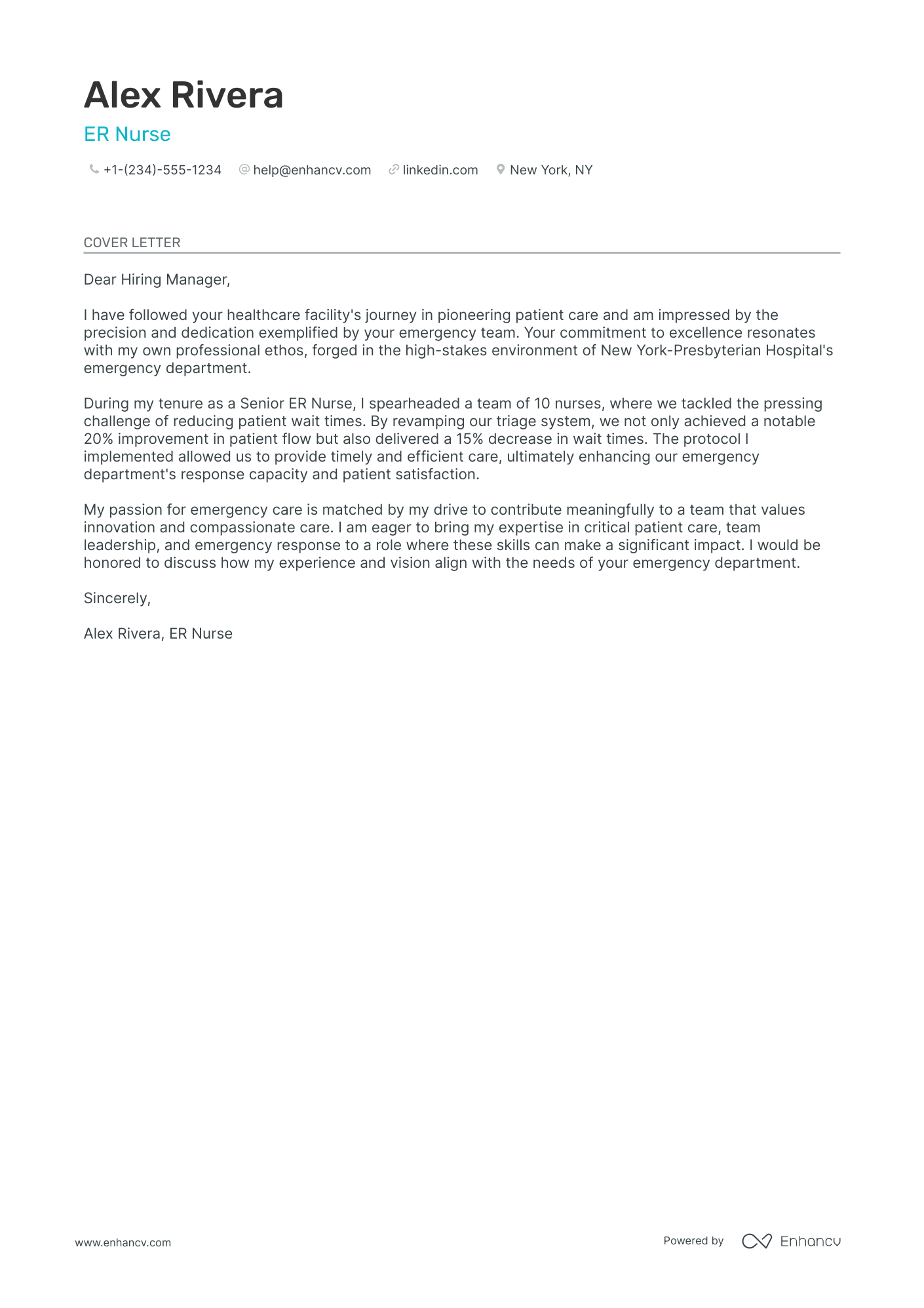
Hemodialysis Nurse
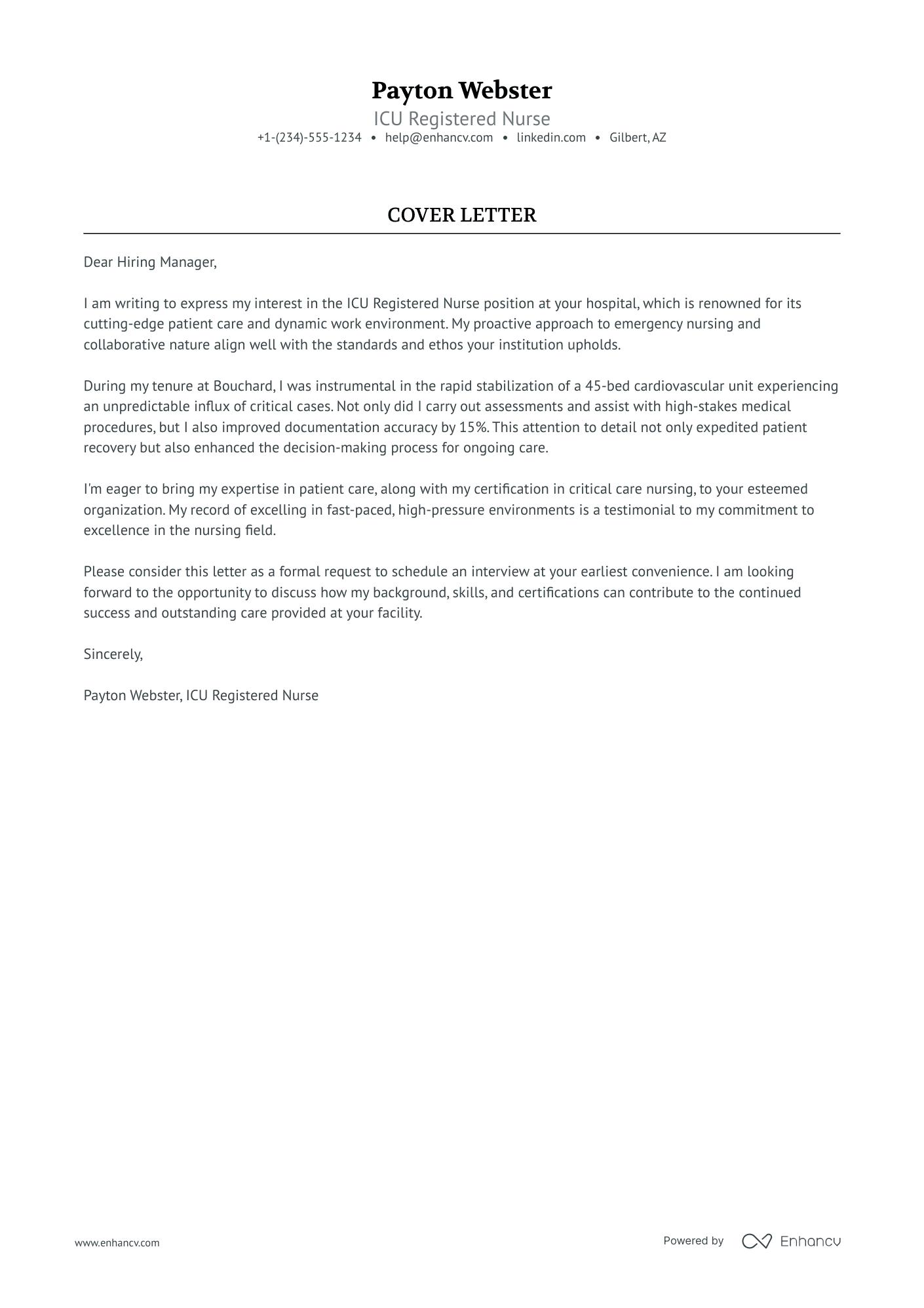
Infection Control Nurse
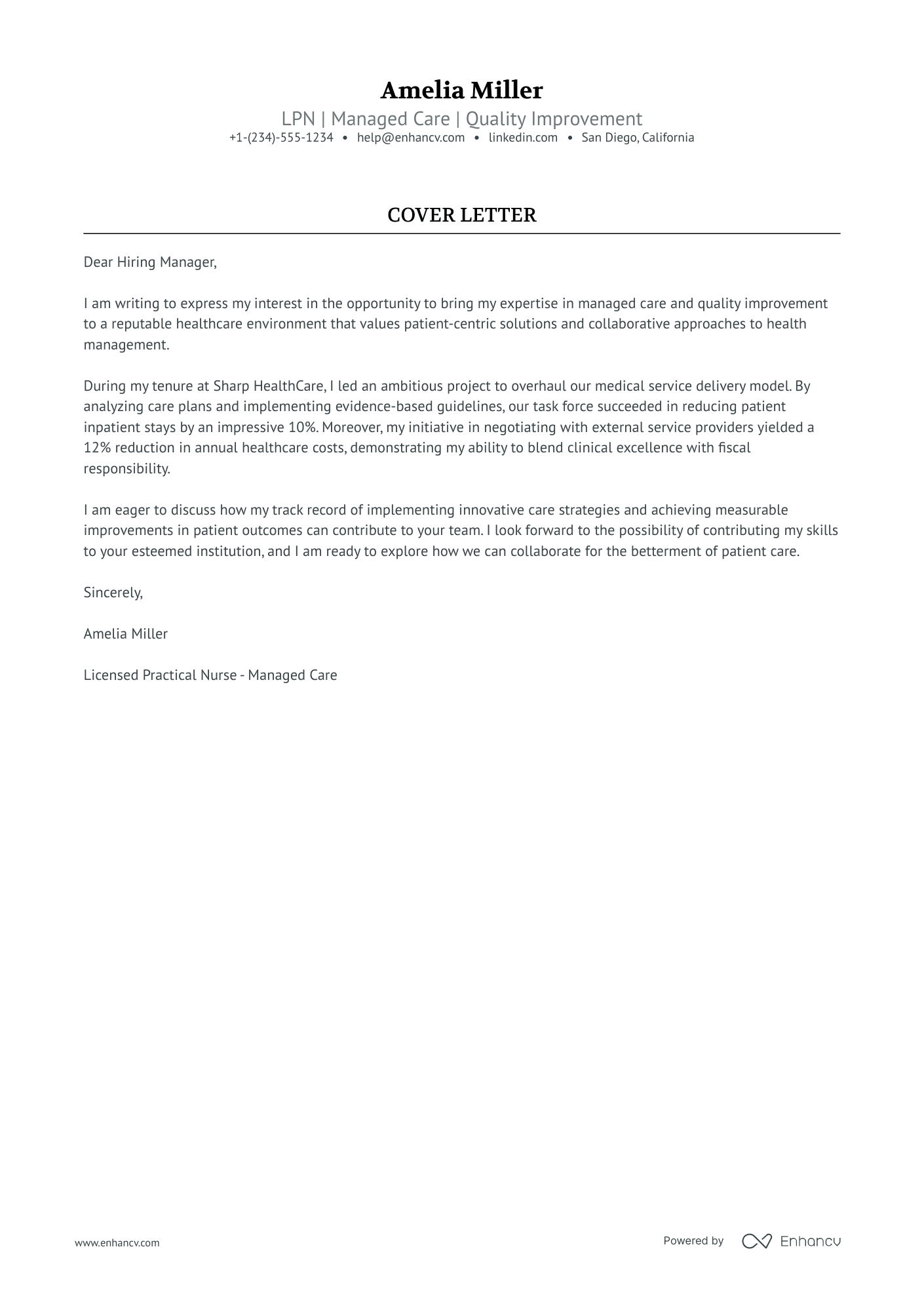
Medical Surgical Nurse
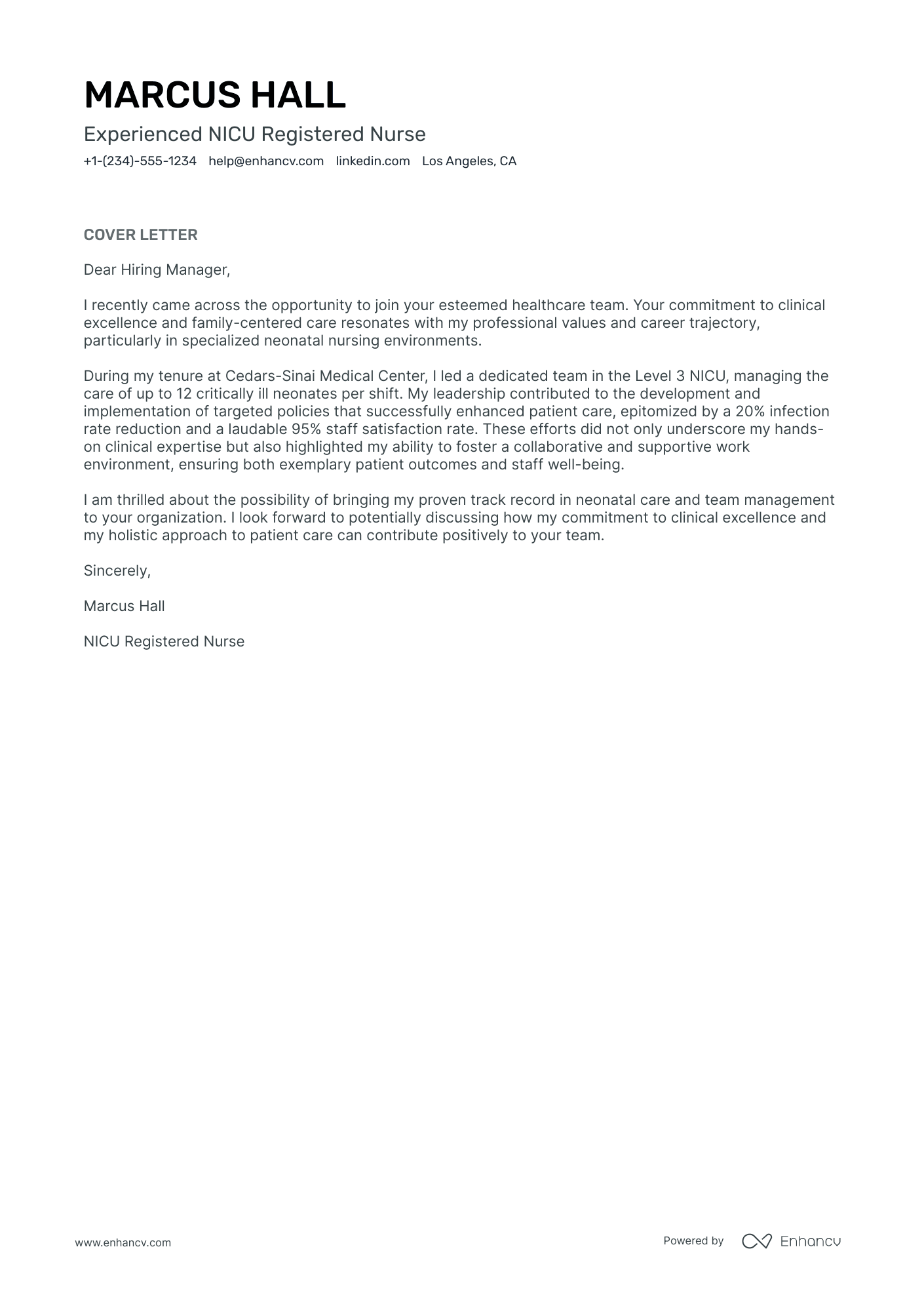
Nurse Anesthetist
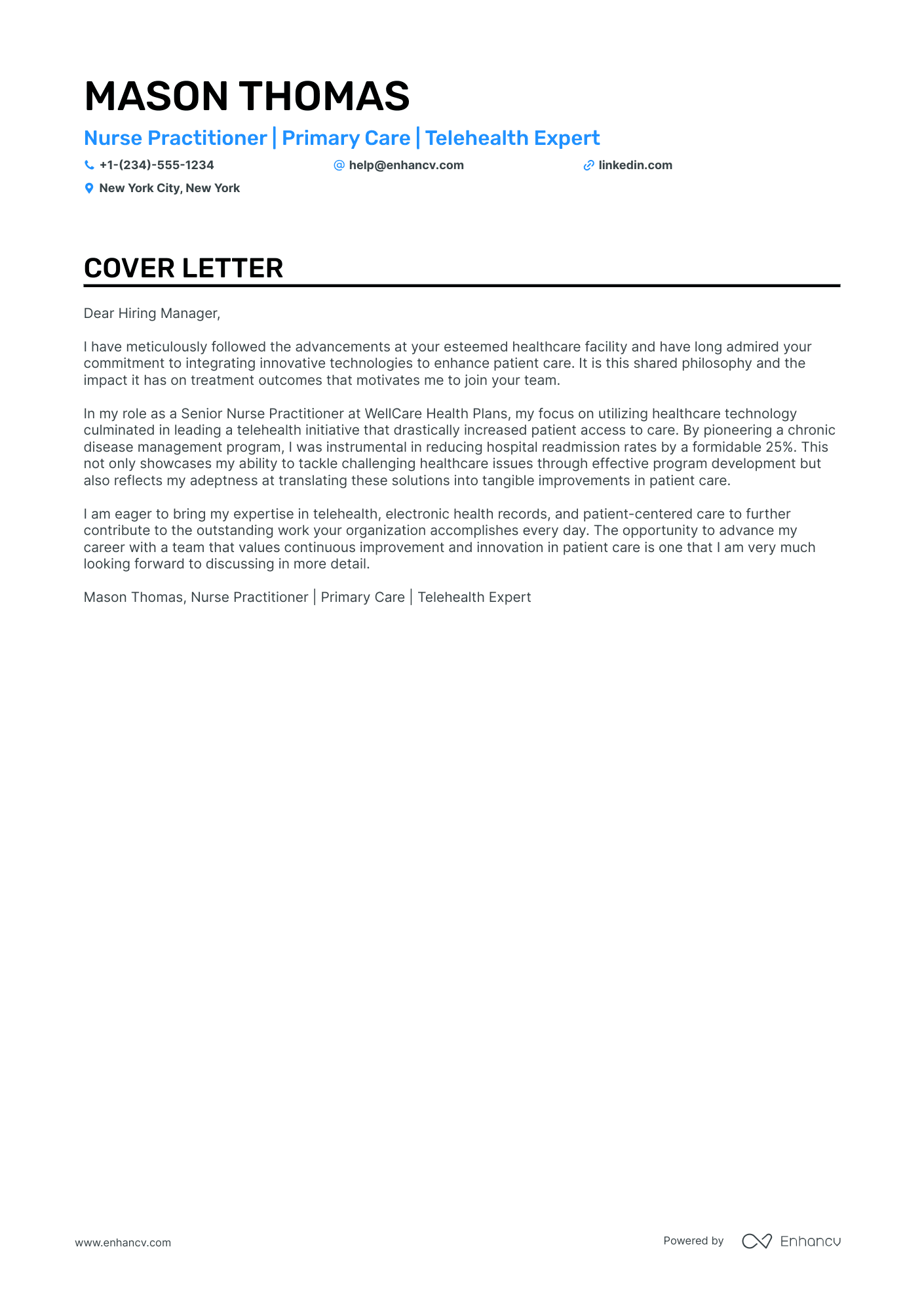
Nurse Practitioner
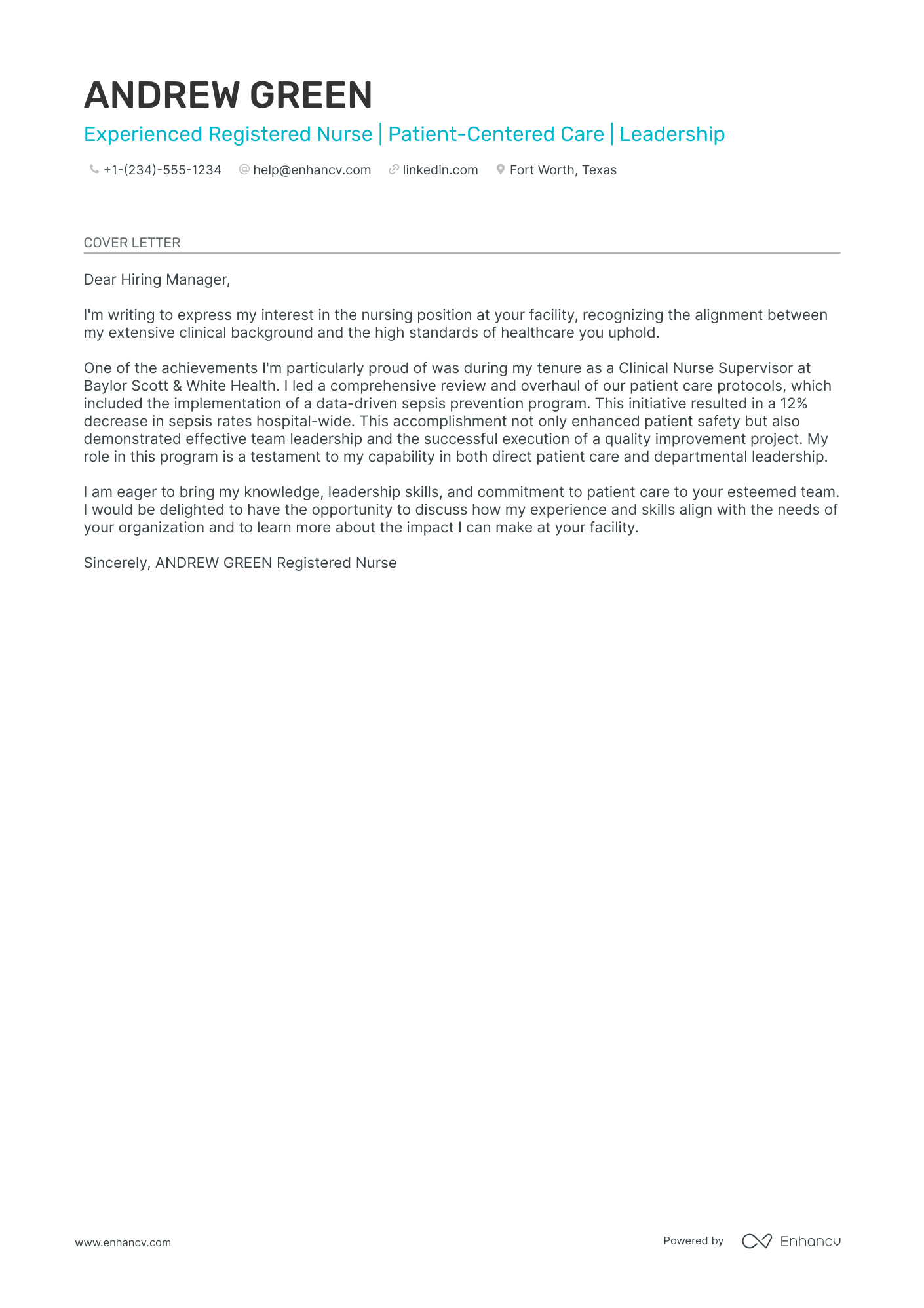
Occupational Health Nurse
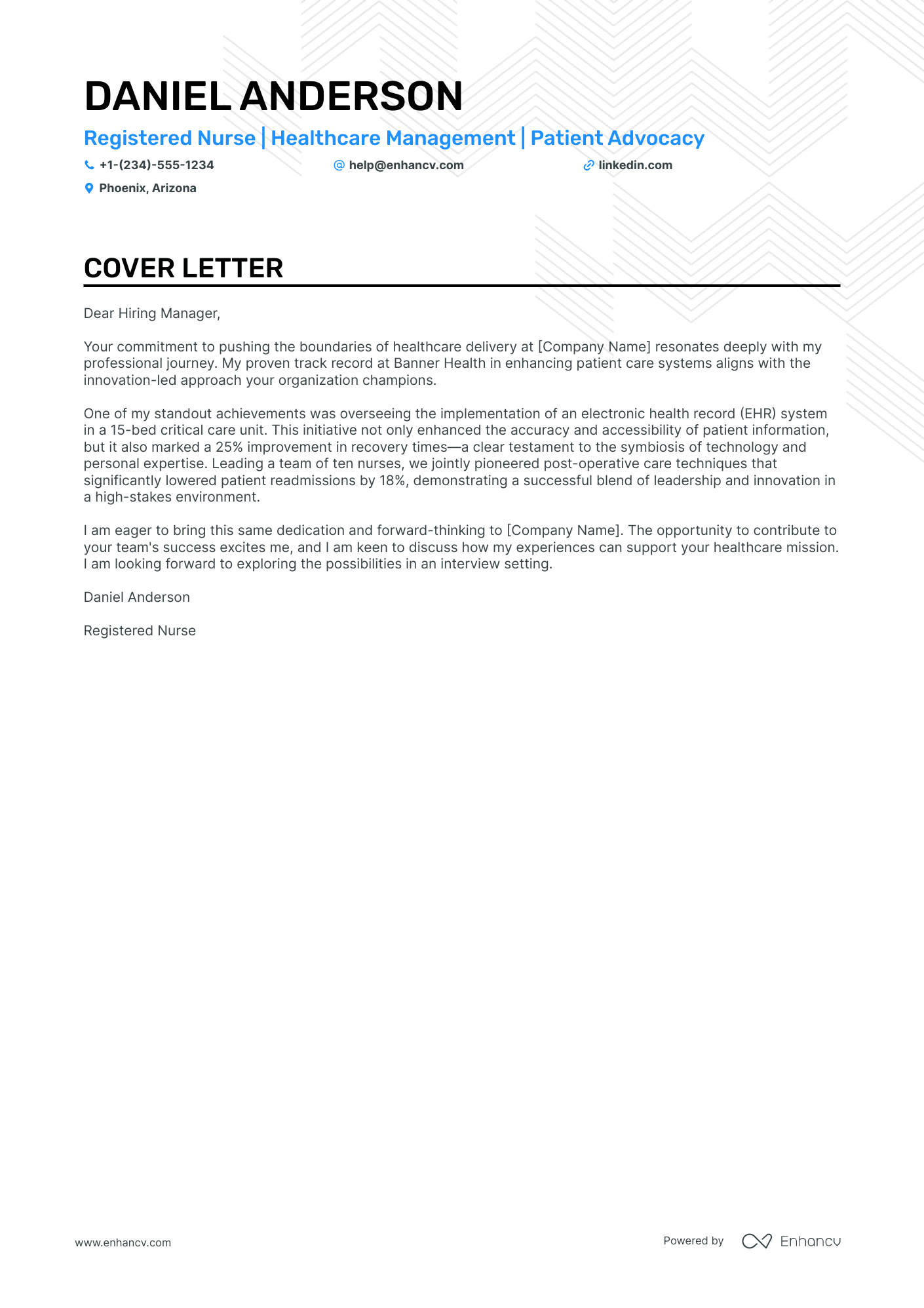
Pediatric Nurse
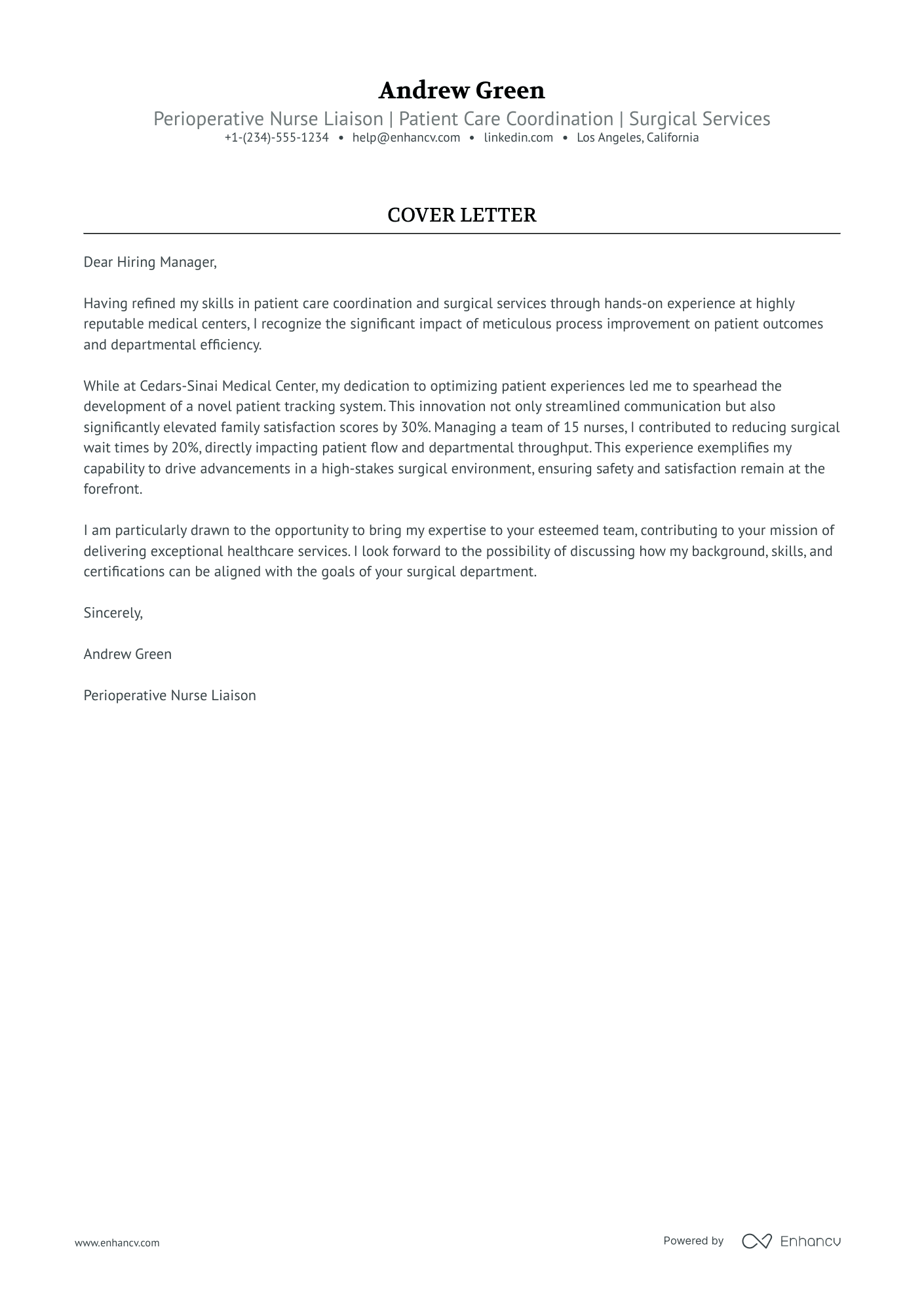
Perioperative Nurse
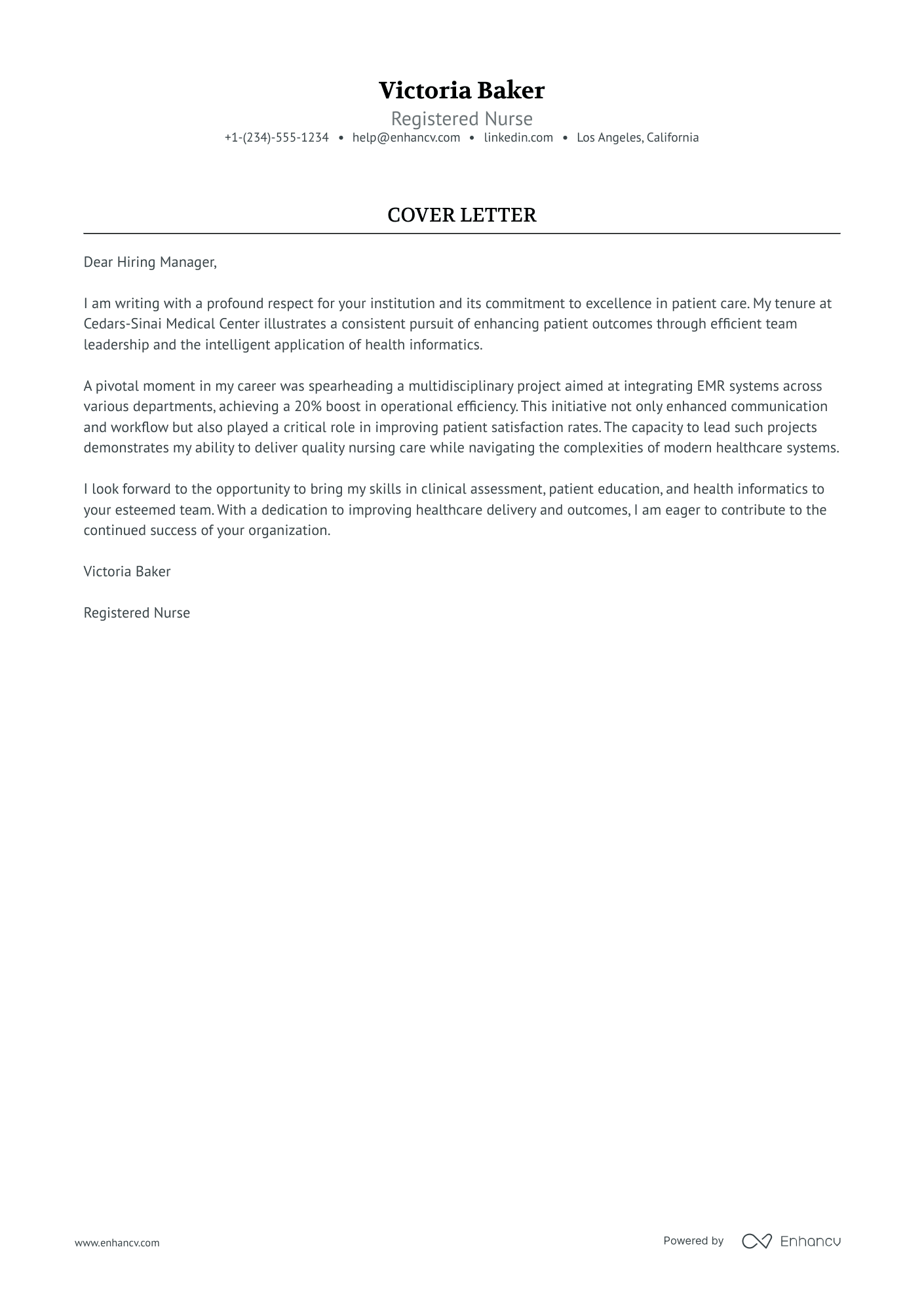
Practice Nurse
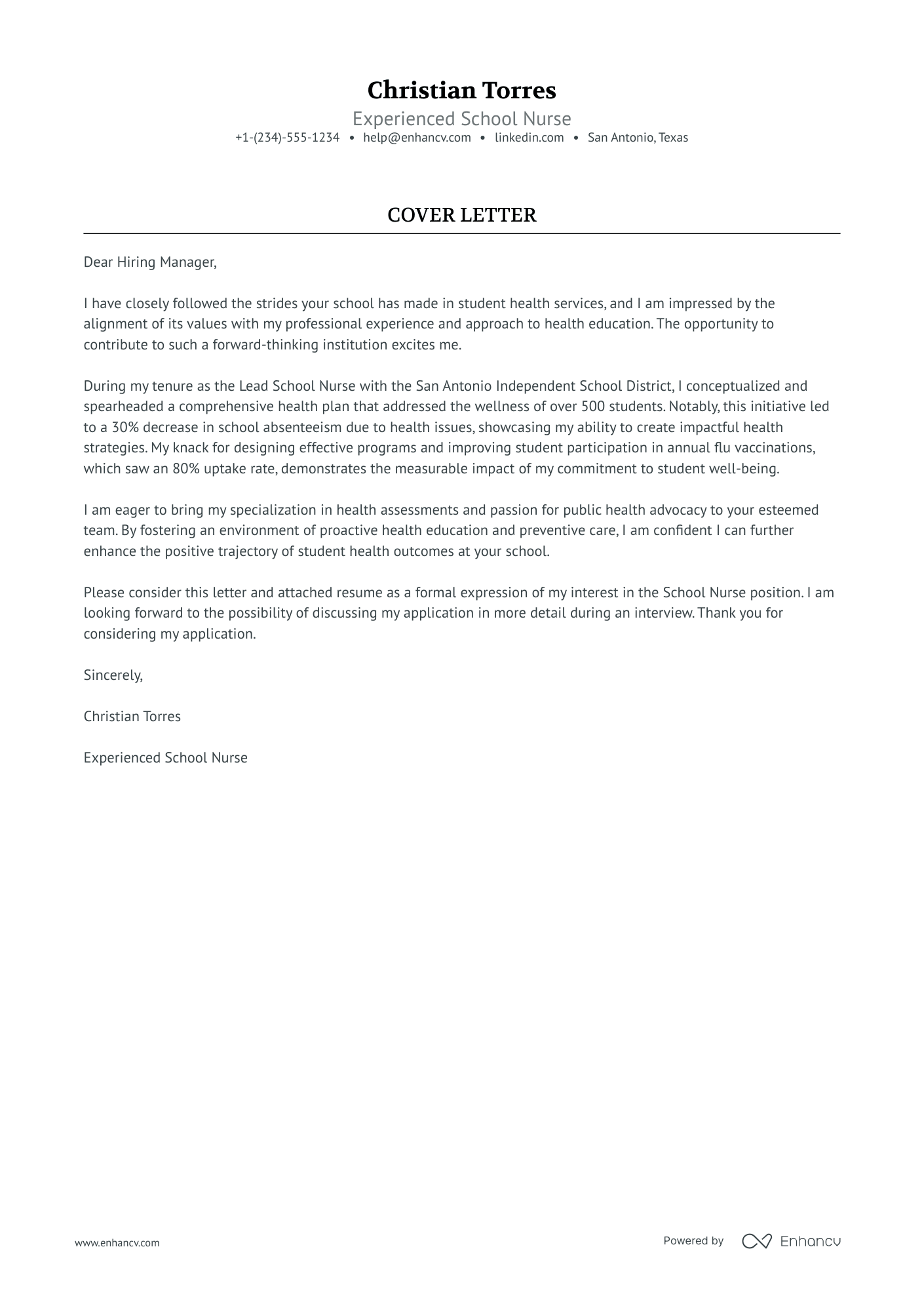
School Nurse
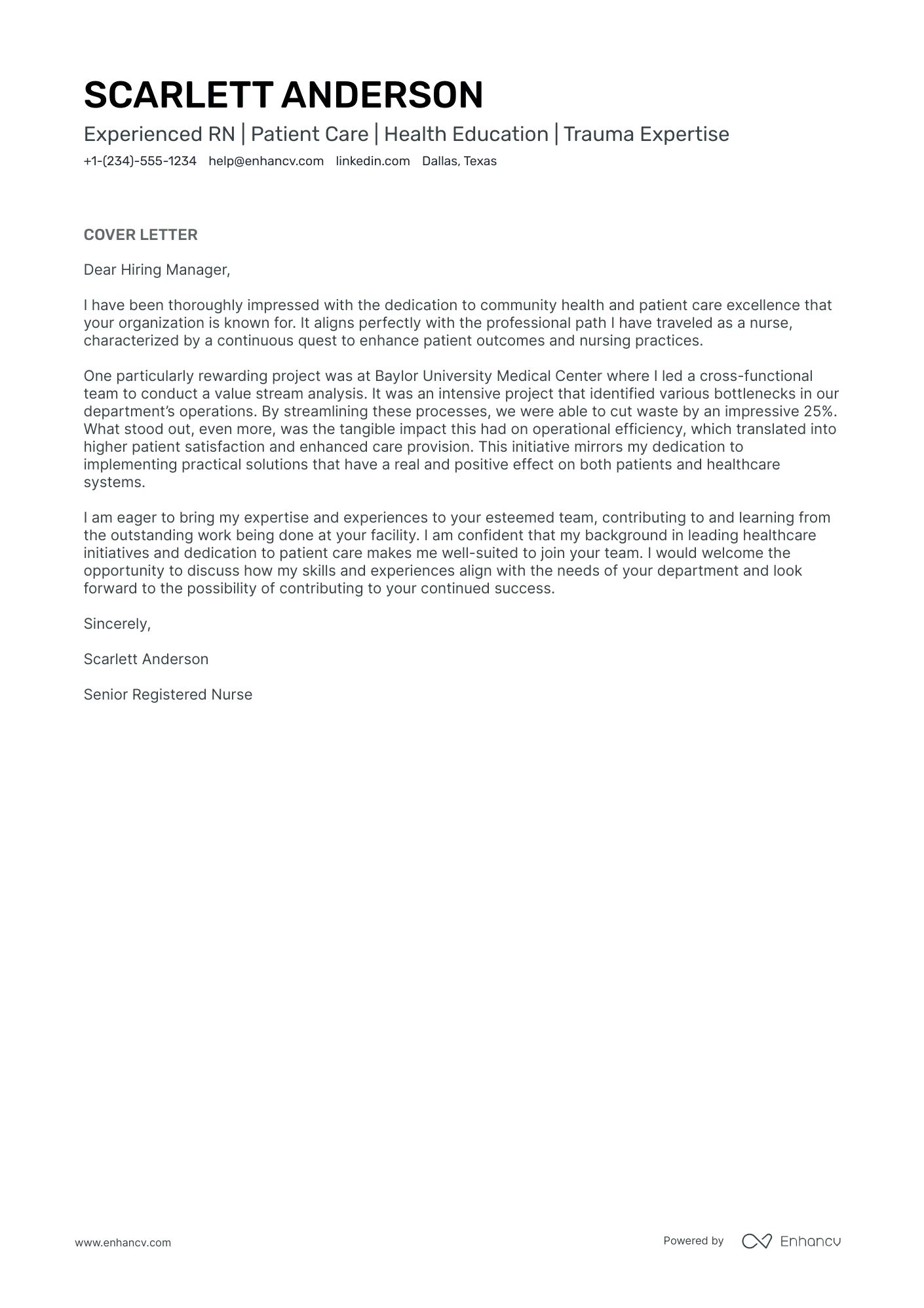
Staff Nurse
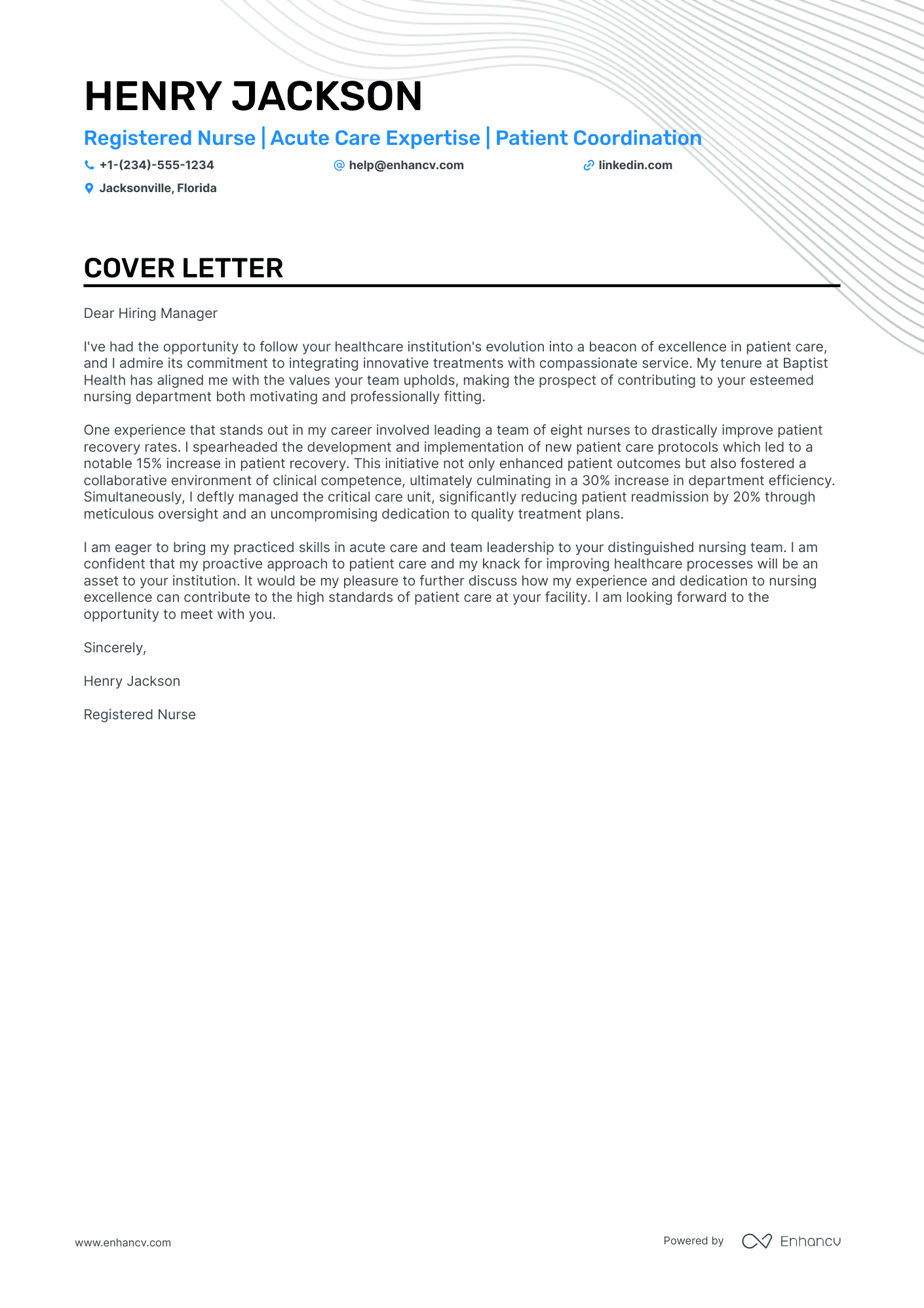
Surgical Nurse
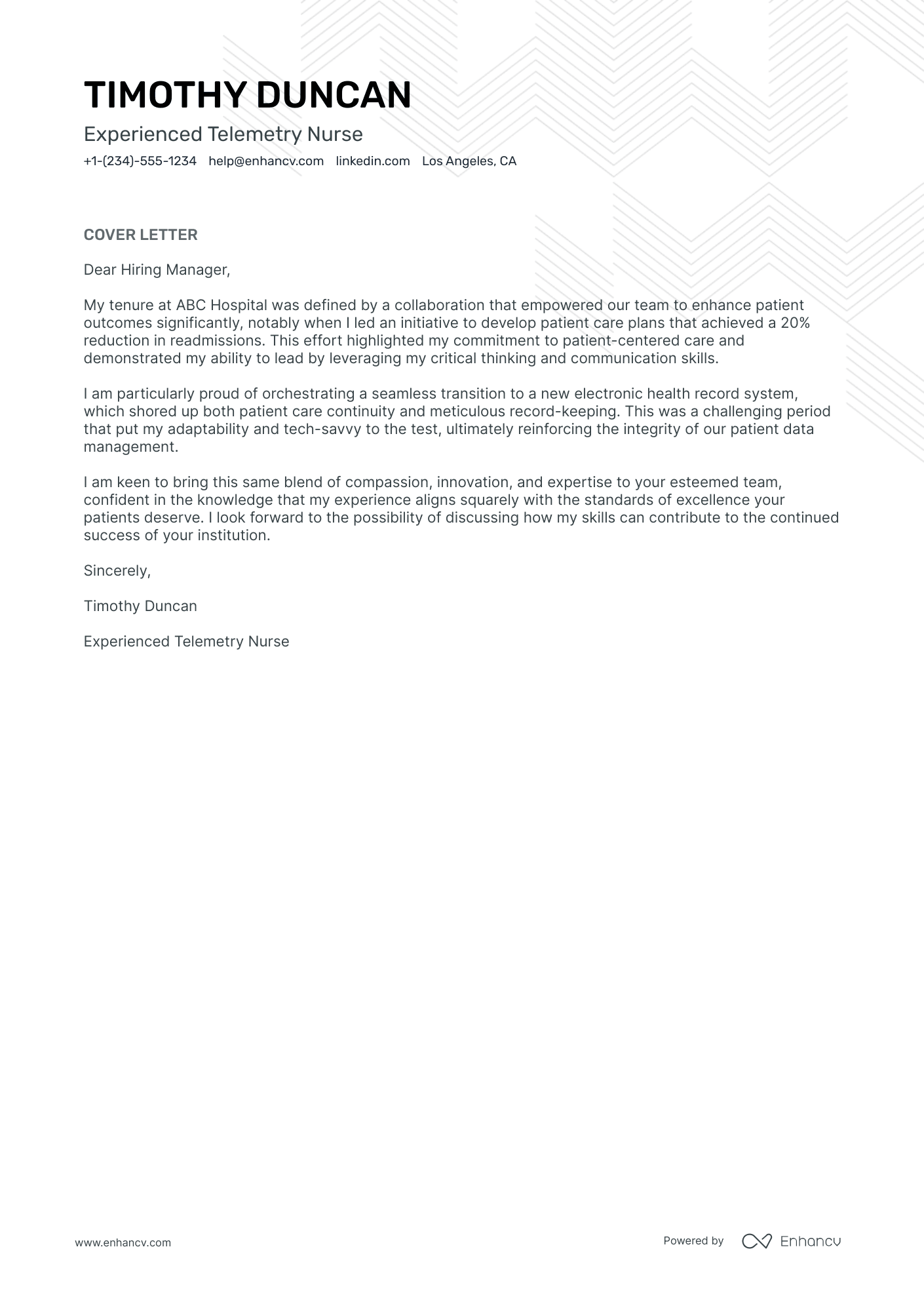
Telemetry Nurse
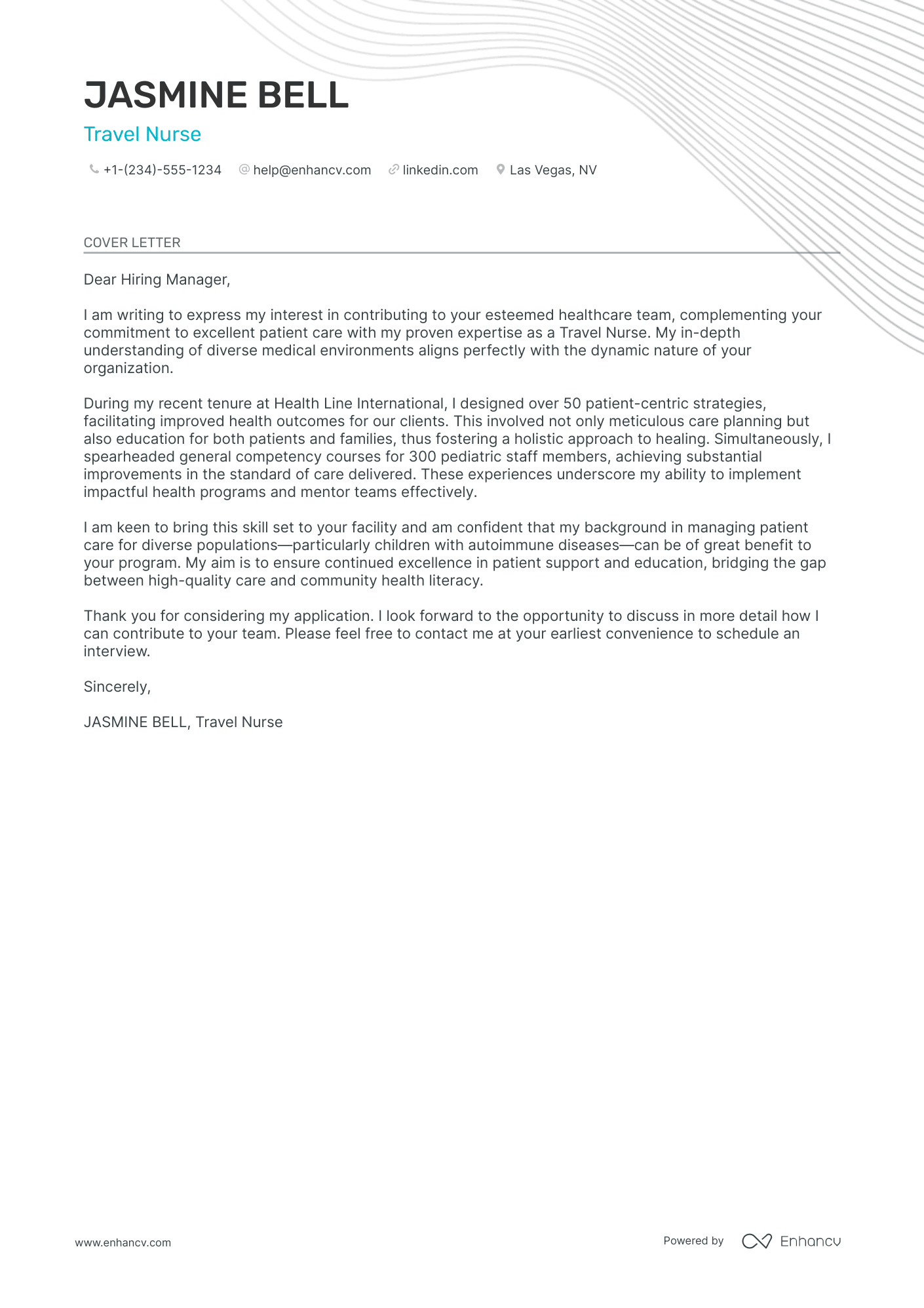
Travel Nurse
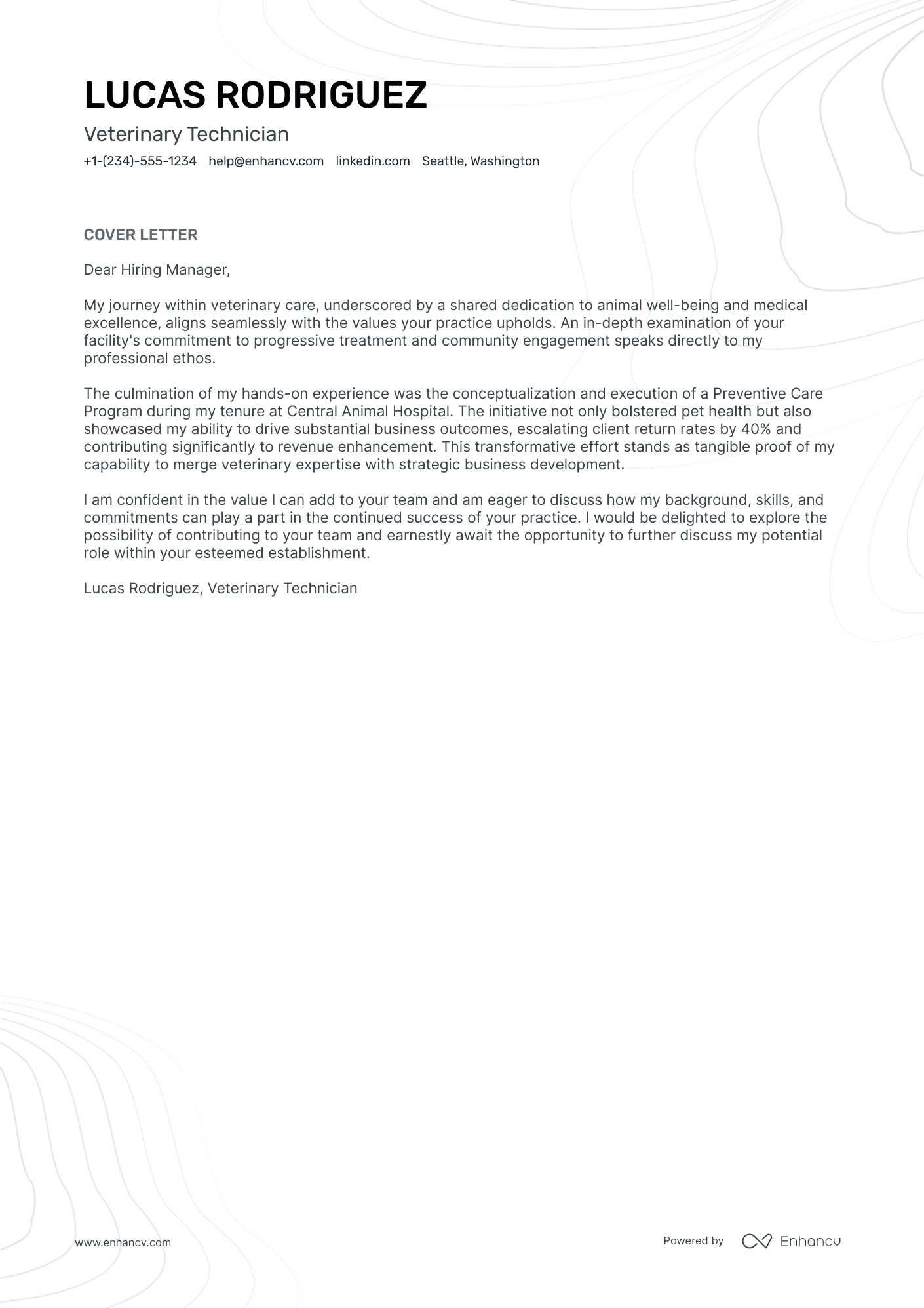
Veterinary Nurse
Written by The Enhancv Team
Cover Letter Guide
Nurse Cover Letter Sample
Cover Letter Format
Cover Letter Salutation
Cover Letter Introduction
Cover Letter Body
Cover Letter Closing
No Experience Nurse Cover Letter
Key Takeaways

Embarking on your job search, you've swiftly discovered the importance of a well-crafted nurse cover letter, a step that often feels daunting. Beyond your resume, this letter is your chance to narrate your proudest professional achievement in a story that captivates your future employer. While maintaining formality, sidestep the clichés that bury your unique voice, and keep it concise; your powerful, one-page introduction can set the stage for career success. Let's dive in and design a cover letter that stands out.
- Including all the must-have paragraphs in your structure for an excellent first impression;
- Learning how to write individual sections from industry-leading cover letter examples;
- Selecting the best accomplishment to tell an interesting and authority-building professional story;
- Introducing your profile with personality, while meeting industry standards.
And, if you want to save some time, drag and drop your nurse resume into Enhancv's AI, which will assess your profile and write your job-winning cover letter for you.
If the nurse isn't exactly the one you're looking for we have a plethora of cover letter examples for jobs like this one:
- Nurse resume guide and example
- Social Work Student cover letter example
- Oral Surgery Assistant cover letter example
- Licensed Practical Nurse cover letter example
- Pacu Nurse cover letter example
- Nicu Nurse cover letter example
- Ob Gyn Medical Assistant cover letter example
- Hemodialysis Nurse cover letter example
- Public Health cover letter example
- Medical Surgical Nurse cover letter example
- Pediatric Nurse cover letter example
Nurse cover letter example
TAYLOR FOSTER
Chicago, IL
+1-(234)-555-1234
- Highlighting specific achievements related to the role, such as reducing infection rates, shows the candidate’s impact on previous organizations and implies potential benefits for the new employer.
- Emphasizing leadership experience and the ability to manage a multidisciplinary team aligns with responsibilities that may be required in a Registered Nurse position at a hospital.
- Illustrating a commitment to patient care and safety helps align the candidate's values with those of the healthcare facility, which is an essential aspect of working in a hospital environment.
- Explicitly stating the willingness to discuss how the candidate's skills and experience can benefit the hospital demonstrates proactive engagement and eagerness to contribute to the institution's mission.
Standard formatting for your nurse cover letter
Structure your nurse cover letter, following industry-leading advice, to include:
- Header - with your name, the role you're applying for, the date, and contact details;
- Greeting - make sure it's personalized to the organization;
- Introduction paragraph - no more than two sentences;
- Body paragraph - answering why you're the best candidate for the role;
- Closing paragraph - ending with a promise or a call to action;
- Signature - now that's optional.
Set up your nurse cover letter for success with our templates that are all single-spaced and have a one-inch margin all around.
Use the same font for your nurse cover as the one in your resume (remember to select a modern, Applicant Tracker System or ATS favorites, like Raleway, Volkhov, or Chivo instead of the worn-out Times New Roman).
Speaking of the ATS, did you know that it doesn't scan or assess your cover letter? This document is solely for the recruiters.
Our builder allows you to export your nurse cover letter in the best format out there: that is, PDF (this format keeps your information intact).
The top sections on a nurse cover letter
- Header : Includes the nurse's contact information, the date, and the employer's contact details; this section sets a professional tone and ensures the recruiter knows who the letter is from and how to get back in touch.
- Greeting : Addresses the hiring manager or recruitment team by name if possible; personalization shows the nurse has done their research and is genuinely interested in the position at that specific healthcare facility.
- Introduction : Briefly introduces the nurse, stating their current role, years of experience, and enthusiasm for the position applied for; this segment hooks the reader and gives a snapshot of the nurse's professional identity.
- Body : Describes the nurse's relevant experience, special skills, accomplishments, and any certifications that are pertinent to the job posting; it provides proof of competence and illustrates how they can contribute to the healthcare team and patient care.
- Closing : Summarizes the nurse’s interest in the role, thanks the reader for considering their application, and includes a call-to-action, such as expressing eagerness to discuss how they can contribute to the facility in an interview; it wraps up the letter with politeness and forward momentum.
Key qualities recruiters search for in a candidate’s cover letter
- Clinical skills and technical knowledge: Shows that the candidate is well-prepared to perform necessary medical procedures and provide high-quality patient care.
- Excellent communication skills: Enables effective interaction with patients, families, and the healthcare team, and is crucial for patient education and advocacy.
- Compassion and empathy: Essential for providing patient-centered care and for building trust and rapport with patients undergoing stressful health challenges.
- Adaptability and flexibility: Demonstrates the ability to handle the fast-paced and often unpredictable nature of healthcare environments.
- Attention to detail: Critical for administering medications, updating patient records accurately, and ensuring patient safety.
- Teamwork and collaboration: Vital for working effectively with interdisciplinary healthcare teams and ensuring cohesive patient care.
Greeting recruiters with your nurse cover letter salutation
What better way to start your conversation with the hiring manager, than by greeting them?
Take the time to find out who the professional, recruiting for the role, is.
Search on LinkedIn, the company website. And for those still keen on making a fantastic first impression, you could even contact the organization, asking for the recruiter's name and more details about the job.
Address recruiters in the nurse greeting by either their first name or last name. (e.g. "Dear Anthony" or "Dear Ms. Smarts").
If you're unable to discover the recruiter's name - don't go for the impersonal "To whom it may concern", but instead use "Dear HR team".
List of salutations you can use
- Dear Hiring Manager,
- Dear [Employer's Name],
- Dear [Department] Team,
- Dear [Title] [Last Name],
- Dear [Job Title] Hiring Committee,
Get creative with your nurse cover letter introduction
Recruiters are going to assess plenty of candidate profiles for the role. Thus, anything you do to stand out will win you brownie points.
Use your nurse cover letter introduction to share something memorable about your experience .
But before you go down the rabbit hole of creativity and humor, align your message with the company culture.
For example, if you are applying for a role in some startup, use those first two sentences to tell a funny story (about your experience) to quickly connect with the recruiter.
What to write in the body of your nurse cover letter
Now that you've got your intro covered, here comes the heart and soul of your nurse cover letter.
It's time to write the middle or body paragraphs . This is the space where you talk about your relevant talent in terms of hard skills (or technologies) and soft (or people and communication) skills.
Keep in mind that the cover letter has a different purpose from your nurse resume.
Yes, you still have to be able to show recruiters what makes your experience unique (and applicable) to the role.
But, instead of just listing skills, aim to tell a story of your one, greatest accomplishment.
Select your achievement that:
- covers job-crucial skills;
- can be measured with tangible metrics;
- shows you in the best light.
Use the next three to six paragraphs to detail what this success has taught you, and also to sell your profile.
Closing paragraph basics: choose between a promise and a call to action
You've done all the hard work - congratulations! You've almost reached the end of your nurse cover letter .
But how do you ensure recruiters, who have read your application this far, remember you?
Most nurse professionals end their cover letter with a promise - hinting at their potential and what they plan on achieving if they're hired.
Another option would be to include a call for follow-up, where you remind recruiters that you're very interested in the opportunity (and look forward to hearing from them, soon).
Choose to close your nurse cover letter in the way that best fits your personality.

Keep this in mind when writing your zero experience nurse cover letter
Even though you may not have any professional experience , your nurse cover letter should focus on your value.
As a candidate for the particular role, what sort of skills do you bring about? Perhaps you're an apt leader and communicator, or have the ability to analyze situations from different perspectives.
Select one key achievement from your life, outside work, and narrate a story that sells your abilities in the best light.
If you really can't think of any relevant success, you could also paint the picture of how you see your professional future developing in the next five years, as part of the company.
Key takeaways
Winning recruiters over shouldn't be difficult if you use your nurse cover letter to tell a story that:
- Is personalized by greeting your readers and focusing on key job skills greets;
- Isn't spread all over the place, but instead focuses on one key achievement and selling your value as a professional;
- Introduces your enthusiasm for the role, passion for the job, or creativity in communication;
- Is also visually appealing - meeting the best HR practices;
- Ends with a nod to the future and how you envision your growth, as part of the company.
Nurse cover letter examples
Explore additional nurse cover letter samples and guides and see what works for your level of experience or role.
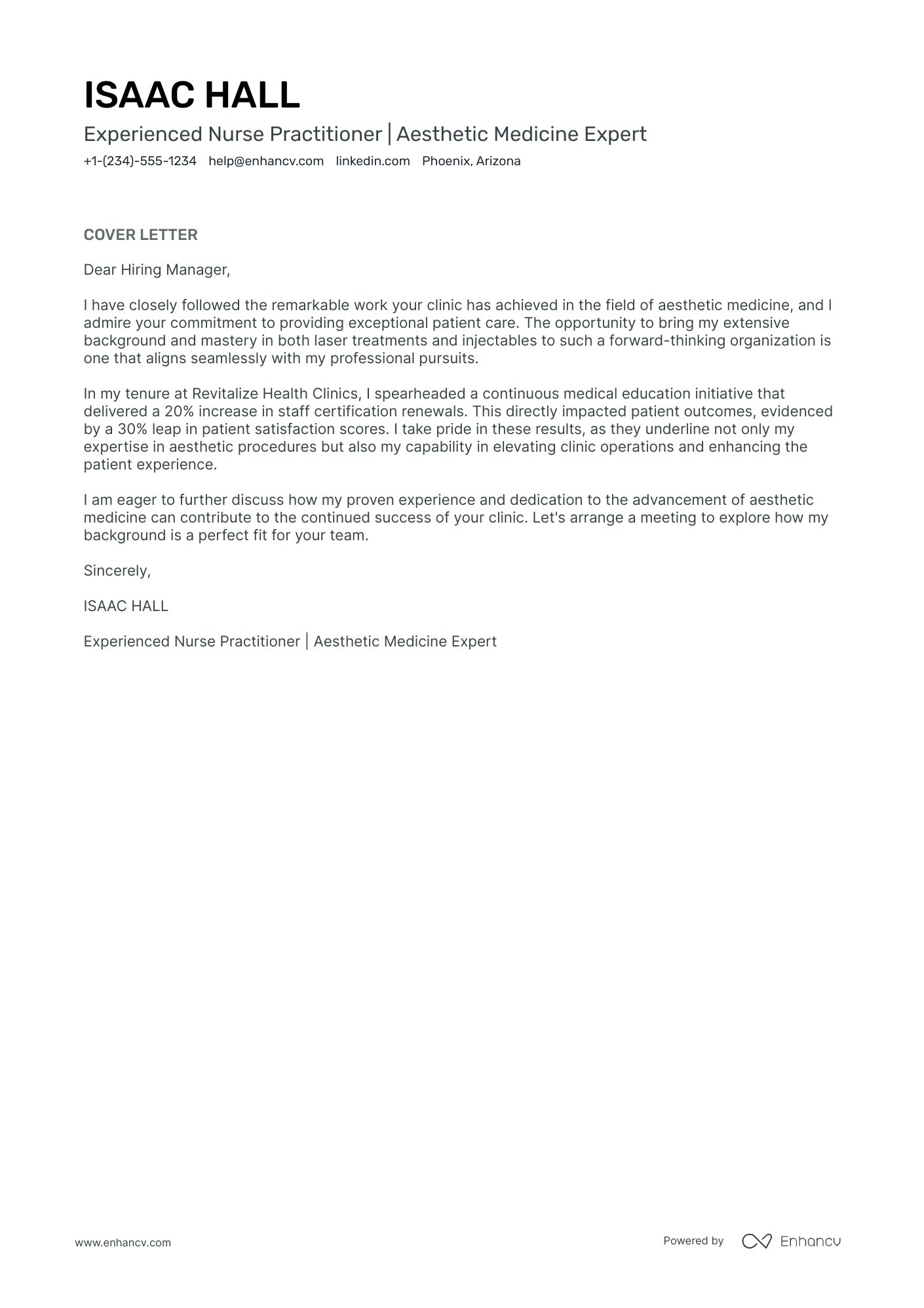
Cover letter examples by industry

AI cover letter writer, powered by ChatGPT
Enhancv harnesses the capabilities of ChatGPT to provide a streamlined interface designed specifically focused on composing a compelling cover letter without the hassle of thinking about formatting and wording.
- Content tailored to the job posting you're applying for
- ChatGPT model specifically trained by Enhancv
- Lightning-fast responses

How To Write a Resume for France – Applying for a Job in France? Here's the Right Resume Format and Rules To Follow!
How do left-brainers and right-brainers organize their new year’s resolutions, how to get a job after being fired: 10 sure-fire steps to get you back in the game, how to list a major & minor on your resume (with examples), can you put future jobs on resume, how to write a great linkedin connection message [with examples].

How to Write a Nursing Cover Letter (2024 Guide + Templates)
You found the perfect nursing job but now you need to cover letter.
In this ultimate guide, learn how to write a cover letter for nursing, step by step, with examples for every nursing situation. We’ve got you covered whether you are a new graduate with no experience or a veteran nurse with years of experience under your scrubs. At the end, we’ll even give you full examples of sample nursing cover letters.
The Importance of a Well-Written Nursing Cover Letter

Table of Contents
Here is why a good cover letter is so important:
- Stand out from the crowd: With numerous applicants vying for coveted nursing positions, a strong cover letter can set you apart and make a lasting impression.
- Show your passion: A well-crafted cover letter allows you to showcase your genuine enthusiasm for the field of nursing, demonstrating your dedication to providing quality care.
- Highlight relevant skills and experiences: Use this opportunity to succinctly outline key qualifications that make you an ideal candidate for the job. A compelling cover letter highlights your unique abilities and demonstrates how they align with the specific requirements of the role.
In essence, a carefully written nursing cover letter can be crucial in securing interviews and ultimately landing your dream nursing position. Take the time to craft one that effectively communicates your skills, experiences, and passion within concise yet powerful sentences.
Understanding the Structure and Format of a Nursing Cover Letter
Like most writing, a nursing cover letter is built from a structure:
Introduction
In your nursing cover letter, begin with a clear and succinct introduction that states your interest in the position.
Mention any personal connection or previous experience with the hospital or organization you are applying to, as this can make your application stand out.
Body Paragraphs
Next, use the body paragraphs to highlight your relevant skills and experiences.
Focus on discussing specific examples where you have demonstrated these skills in past roles. Include information about your education, certifications, and any specialized training or clinical experience that makes you well-suited for the role.
- Mention why you are interested in working at their particular institution.
- Highlight any specific qualifications they have listed in the job description.
- Explain how your skills align with their needs and demonstrate why you would be an asset to their team.
Closing Statement
In closing, reiterate your interest in the position and express gratitude for considering your application.
Provide contact information where they can reach you if they need further information or want to schedule an interview. Remember to sign off using a professional closing such as “Sincerely” or “Best regards.”
Key Elements to Include in Your Nursing Cover Letter
When putting your nursing cover letter together, focus on these key elements:
- Greeting: Begin your nursing cover letter with a professional greeting and introduce yourself. Mention the specific position you are applying for and briefly explain why you are interested in it.
- Relevant Skills and Experience: Highlight your relevant skills, qualifications, and experience that make you a strong candidate for the nursing position. Link these skills to specific examples of how you have successfully applied them in previous roles or educational settings.
- Passion for Patient Care: Express your genuine passion for caring for patients and providing high-quality healthcare services. Emphasize your commitment to promoting patient well-being, safety, and comfort.
- Understanding of Healthcare Policies & Procedures: Demonstrate your knowledge of healthcare policies, regulations, protocols, and best practices relevant to the role you are applying for. This shows employers that you can effectively navigate complex medical environments while adhering to industry standards.
- Teamwork Abilities: Explain how well you work within interdisciplinary teams by showcasing examples where collaboration was essential to achieving positive patient outcomes or participating in quality improvement initiatives.
- End on High Note: Close on a positive note by expressing gratitude for considering your application and reiterating your interest in the opportunity to contribute as part of their nursing team.
Tailor Your Nursing Cover Letter to the Job Description
One of the best ways to write a great nursing cover letter is to customize it to the job description:
- Analyze the job description: Read through the job description carefully and highlight key requirements and qualifications. This will help you understand what the employer is specifically looking for in a candidate.
- Match your skills and experiences: Once you have identified the key requirements, tailor your cover letter to showcase how your skills, experiences, and achievements align with them. Use concrete examples from your past work or clinical experiences to demonstrate your ability to meet those needs.
- Provide examples of success: Instead of simply stating that you have certain skills or experience, provide specific examples of how you have successfully used them in previous roles. This will make your claims more credible and relevant.
Next, you want to highlight your closely related achievements.
Highlight Relevant Achievements:
- Utilize bullet points or short paragraphs to effectively communicate relevant accomplishments that highlight how you meet each requirement mentioned in the job description.
- Include specific details such as patient outcomes improved, awards received, or certifications earned.
- Make sure these examples emphasize qualities like compassion, teamwork, and problem-solving abilities that are crucial in nursing roles.
By closely aligning your cover letter with the job description, you show potential employers that you have taken time and care in considering their needs while highlighting why you would be an excellent fit for their team.
Tips for Writing an Attention-Grabbing Opening Paragraph
Crafting an attention-grabbing opening paragraph for your nursing cover letter can make all the difference in getting noticed by potential employers.
Here are a few tips to help you kickstart your letter with impact:
- Start with a compelling statement : Begin your cover letter with a strong and captivating sentence that highlights your passion for nursing or your relevant experience. For example, “With a strong commitment and a caring attitude, coupled with five years in critical care, I am thrilled to bring my skills to XYZ Hospital.”
- Show enthusiasm and knowledge: Express genuine excitement for the position and showcase your understanding of the healthcare industry. Demonstrate how you have researched the organization and align its values with yours.
- Grab attention with achievements: Mention specific accomplishments or accolades that demonstrate your competency and dedication as a nurse. This could include certifications, awards, or measurable improvements in patient outcomes.
By starting off on the right foot, you can instantly capture the reader’s interest and compel them to continue reading about why you are an ideal candidate for their nursing role.
Showcase Your Passion for Nursing in the Body of the Cover Letter
In the body, throw in your passion and commitment to nursing:
- Highlight your relevant experience: Begin by discussing any previous healthcare or nursing experiences you have had. Emphasize how these experiences have shaped your passion for nursing and developed your skills in patient care.
- Share personal stories: Share anecdotes or stories that showcase your commitment to helping others and making a difference in their lives. Explain how these experiences have motivated you to pursue a career in nursing.
- Demonstrate knowledge of the field: Show that you are well-informed about current issues, trends, and advancements in nursing. Discuss specific areas of interest or specialties within nursing that excite you and explain why they align with your passion.
- Express eagerness to learn and grow: Convey a strong desire for professional development and lifelong learning. Mention any certifications, workshops, or continuing education programs you plan to pursue to enhance your skills as a nurse.
- Connect with the organization’s mission: Research the healthcare institution or organization where you are applying and highlight aspects of their mission statement or values that resonate with your own goals as a nurse.
Remember to keep each paragraph focused on one main idea, utilizing brief sentences that clearly convey your enthusiasm for nursing while showcasing your understanding of the profession.
Here is a good video about how to write a nursing cover letter:
Addressing Gaps in Your Nursing Experience or Employment History
No one is perfect (certainly not me), so if you have gaps in your employment or skill set, here is how to best handle them.
Addressing Employment Gaps
When addressing gaps in your nursing experience or employment history, it’s important to be honest and transparent.
Describe any extended periods of unemployment by stating the reason for your absence from work, such as furthering your education, taking care of family members, or personal health reasons. Highlight any skills or knowledge gained during these breaks that are applicable to the nursing field.
Addressing Skill Gaps
If you have limited experience with certain areas of nursing, acknowledge this in a positive light and express your willingness to learn and acquire those skills.
Emphasize any related coursework or training you have completed.
Don’t leave out any clinical rotations or internships where you were able to practice these skills even if not in a professional setting.
- Discuss how you plan to continue expanding your knowledge and expertise through ongoing education opportunities.
- Highlight any certifications or licenses relevant to the specific role you are applying for.
- Mention any volunteer work or unpaid experiences that provided exposure to different aspects of nursing.
By addressing gaps in employment history or skill set proactively in your cover letter, potential employers will understand that while there may have been breaks in your career progression, you remain committed to growing professionally and providing exceptional care.
Dos and Don’ts for a Successful Nursing Cover Letter
Now let’s go over some helpful dos and don’ts for writing a successful nursing cover letter.
Do: Tailor your cover letter to the specific nursing job you are applying for
Research the company you are applying to and customize your cover letter accordingly. Highlight relevant skills, experiences, and accomplishments that make you a strong candidate for the position.
Don’t: Use generic or cliché language in your cover letter
Avoid using common phrases like “I am writing to express my interest” or “I have excellent communication skills.” Instead, focus on specific examples or anecdotes that demonstrate your qualifications and experiences as a nurse.
Do: Start with a powerful introduction that grabs attention
Use an engaging opening sentence that immediately captivates the reader’s interest. Incorporate statistics, patient success stories, or personal experiences to showcase your passion for nursing.
Don’t: Include unnecessary information in your cover letter
Keep it concise and avoid including irrelevant details about unrelated jobs or personal life. Stick to highlighting key achievements and qualifications directly related to nursing.
Remember, formatting is also important:
- Utilize clear headings (like “Education,” “Experience,” etc.) when organizing content within paragraphs
- Use bullet points where applicable
- Keep paragraphs short (around 3 – 5 sentences) By following these dos and don’ts, you can create an effective nursing cover letter that will impress potential employers and increase your chances of securing an interview.
Sample Nursing Cover Letters for Various Scenarios
Check out these short and full examples of nursing cover letters.
Find the one that best fits your scenario and use it as a template from which to customize your letter to a specific job.
1. New Graduate Nurse
Dear Hiring Manager,
I’m reaching out to express my genuine interest in the registered nurse position at your healthcare institution. As a newly minted alumnus of XYZ School of Nursing, I am enthusiastic to initiate my journey in nursing. During my training, I developed strong clinical skills and gained experience in various healthcare settings through internships.
2. Experienced Nurse Seeking Career Change
To Whom It May Concern,
I recently came across the job opening for a case manager at ABC Medical Center, and I would like to apply for this exciting opportunity. Although I have spent several years as an emergency room nurse, I am now ready for a change that allows me to utilize my critical thinking abilities and passion for helping patients on a more holistic level.
3. Registered Nurse with Specialized Certification
I hope this message finds you well. After working as a pediatric nurse for five years, achieving certification in Pediatric Advanced Life Support (PALS) has driven me to seek opportunities where I can make an even greater impact on children’s lives.
4. Nurse Returning to Workforce After a Hiatus
Subject: Application for Registered Nurse Position
Dear [Hospital Name] Hiring Committee,
I am writing with great enthusiasm to apply for the Registered Nurse position at [Hospital Name]. Having taken a sabbatical to raise my family, I am now eager to return to the profession I am passionate about. My experience prior to my break includes five years in a high-paced surgical unit, where I honed my clinical skills and developed a strong ability to work under pressure.
During my time away from the workforce, I kept my nursing knowledge up-to-date through various continuing education courses and volunteer work at local clinics. This experience not only refreshed my skills but also reinforced my commitment to providing compassionate and efficient patient care.
I am particularly drawn to [Hospital Name] due to its reputation for excellence in patient care and its commitment to staff development. I am confident that my background, coupled with my renewed energy and updated skills, make me a strong candidate to join your team. I look forward to the opportunity to discuss how I can contribute to the continued success of your nursing staff.
Sincerely, [Your Name]
5. Nurse Applying for a Research Position
Subject: Application for Clinical Research Nurse Position
Dear Dr. [Last Name],
I am thrilled to submit my candidacy for the Clinical Research Nurse role at [Institute or Hospital Name], as advertised on your website. With a background in oncology nursing and a keen interest in clinical research, I believe I am well-suited to contribute to your innovative research team.
My experience working in an oncology ward has equipped me with in-depth knowledge of cancer treatments and patient care. Furthermore, my involvement in several hospital-based research projects allowed me to develop skills in data collection, patient education, and adherence to research protocols.
What draws me to this role at [Institute or Hospital Name] is your cutting-edge research in cancer therapies. I am particularly interested in contributing to studies that have the potential to improve patient outcomes. I am passionate about the chance to merge my clinical abilities with my interest in research, and I am keen to further develop these skills within a dedicated research environment.
I appreciate your review of my application. I am ecited about the prospect of contributing my clinical know-how to your research team and to meaningful advances in cancer treatment.
Best regards, [Your Name]
6. Nurse Leader Applying for a Management Position
Subject: Application for Nurse Manager Position
Dear [Hospital or Clinic Name] Hiring Committee,
I am drafting this to convey my enthusiasm for the Nurse Manager role at [Hospital or Clinic Name], as listed on your career page. With over a decade of nursing experience, including five years in a leadership role, I am enthusiastic about the possibility of contributing my skills and background to your esteemed institution.
In my present capacity as a Senior Staff Nurse at [Current Hospital Name], I have successfully led a team of 20 nurses, fostering an environment of collaboration, professional development, and high-quality patient care. My responsibilities include staff scheduling, performance evaluation, conflict resolution, and implementing process improvements, all of which have contributed to enhanced team efficiency and patient satisfaction.
Your commitment to [mention any specific initiatives or values of the hospital/clinic] aligns perfectly with my professional ethos. I am particularly impressed with your focus on [mention any notable aspect like community health, innovative care models, etc.]. I am enthusiastic about contributing my leadership abilities and fervor for outstanding nursing to [Hospital or Clinic Name], contributing to both staff development and patient care excellence.
Thank you for reviewing my application. I eagerly await the opportunity to discuss how my background in leadership and nursing can support your nursing team and department goals.
Warm regards, [Your Name]
Final Thoughts: How to Write a Nursing Cover Letter
In essence, your cover letter is an opportunity to personalize your application and bring your resume to life.
It’s an opportunity to showcase your passion for nursing, your dedication to patient care, and your unique qualifications that make you the ideal candidate for the job.
Read This Next:
- 60 About Me Examples (Writing Guide + Free Templates)
- How to Write A Cover Letter with ChatGPT: Prompts + Examples
- How To Write a 2 Week Notice: Examples, Templates, & Guide
- How To Write a Job Posting Ad (Ultimate Guide + 10 Examples)

IMAGES
VIDEO